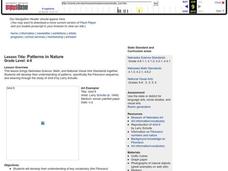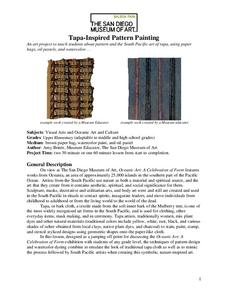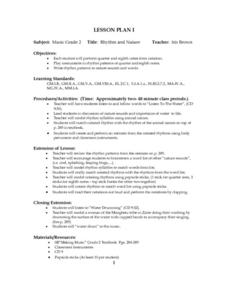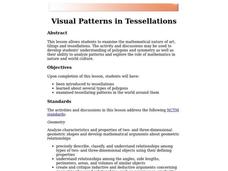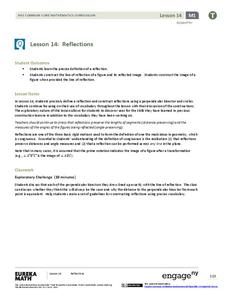Curated OER
Learning about Fibonacci
In this learning about Fibonacci worksheet, students read about Leonardo Fibonacci and his contribution to mathematics, then study the pattern of Fibonacci numbers, in math and in nature.
National Nanotechnology Infrastructure Network
Powers of Ten with the Blue Morpho Butterfly
Explore the powers of ten while examining a Blue Morpho butterfly wing. Learners discover there is a lot more than meets the eye when one looks close enough.
Curated OER
Settlement Exploration: Then and Now
NASA has crafted an imaginative and memorable series of lessons, "NASA and Jamestown Education Module." This lesson is one of the five components. In it, middle schoolers connect history and science by comparing the settlement of...
Curated OER
Patterns in Nature
Students learn about artist Larry Schulte and view examples of his work. They create addition sentence for the first seven numbers of the fibonacci sequence and use unifix cubes to build that sentences. Students color and create three...
Curated OER
Finding Patterns in Fractals
Students discover patterns and sequences. They use a website to explore patterns and fractals. Students share their discovery of fractals and their patterns with the class. They develop a list of patterns used in everyday life.
Curated OER
Representing and Extending Patterns
Students explore repeating and growing patterns. For this patterns lesson, students describe patterns, explore changing patterns and match patterns. Students participate in online activities and read books that show patterns in nature...
Curated OER
A Matter of Pattern
Students explore how shapes can make patterns then make connections as to how elements in a pattern relate to one another. In this matter of pattern lesson, students create a multi-folded paper snowflake. Students engage in a variety of...
San Diego Museum of Art
Tapa-Inspired Pattern Painting
Middle schoolers are encourage to try their hand at traditional Oceania tapa art by crafting their own cloth using brown paper bags. Included in the resource is background information about the cultures of Oceania and their art.
EngageNY
Exploring the Symmetry in Graphs of Quadratic Functions
Math is all about finding solutions and connections you didn't expect! Young mathematicians often first discover nonlinear patterns when graphing quadratic functions. The lesson begins with the vocabulary of a quadratic graph and uses...
ARKive
Darwin and Natural Selection
A presentation on Darwin's theory of evolution and natural selection could be a good addition to your biology class. It provides general information about how animals adapt to their surroundings, as well as how organisms create more...
Curated OER
Changing Energy: Landforms and Dance
Third graders choreograph a dance to represent the changes in nature. In this dance and nature lesson plan, 3rd graders use sharp quick movements to demonstrate changes.
Curated OER
Toothpick Triangles
Explore patterns, variables, and mathematical relationships when you examine patterns with toothpicks and determine the next sequence of figures. Your class writes and justifies a formula based on the sequence. An answer key is included.
Curated OER
Air Quality
Learners observe air quality and monoxide data. In this air quality lesson, students draw conclusions and manipulate data from a one year period on changes in air quality.
Howard Hughes Medical Institute
Gorongosa: Making Observations Activity
Do you have young scientists wanting to make new discoveries rather than just completing the same experiments? Young scientists use their observational skills to identify animals and patterns in animal behavior. Through tracking...
Curated OER
Fibonacci Numbers
Students calculate the Fibonacci sequence of numbers. Through the use of Fibonacci numbers in flowers, leaves, fruits, vegetables, pine cones, and other forms of nature; students explore how Fibonacci numbers occur in nature. Then they...
Curated OER
Balance in Visual Art
High schoolers examine works of art to develop an understanding of the importance of visual balance in works of art and nature. Students research artists and their artwork for examples of visual balance. High schoolers create works of...
Curated OER
Rhythm and Nature
Second graders listen to song "Listen to the Water," discuss nature sounds and importance of water to life, perform quarter and eighth notes from notation, play instruments in rhythm patterns of quarter and eighth notes, and write rhythm...
Curated OER
Visual Patterns in Tessellations
Students explore tessellations as well as various types of polygon. Students examine tessellating patterns in the world around them. Students examine tessellations by creating their own tessellations and completing the included worksheet.
Curated OER
Pattern Detectives
Students discover patterns in language, math and science. They experience patterns by hearing stories, and becoming pattern detectives.
Great Books Foundation
Rattlesnakes
John Muir may be a friend to the natural world, but as a short reading passage confirms, he is no friend to rattlesnakes. As young readers learn about Muir's encounters with the dangerous creatures, they answer four comprehension...
EngageNY
Reflections
Facilitate creativity in your math class as individuals learn the definition of a geometric reflection and correctly construct a model, as well as its reflected image. They use a perpendicular bisector and circles to elaborate on...
Curated OER
Hazards: Fifth Grade Lesson Plans and Activities
After comparing earthquake and volcanic hazards to one another, fifth graders take a closer look at damage associated with a volcanic eruption. They then create a simulation of mudslides due to a volcanic eruption. Using different...
Curated OER
Why Do People Fall in Love?
Students discuss human behavior, sexual selection and the underlying genetic and evolutionary reasons for mate selection. The, in groups, they rate the attractiveness of certain individuals and measure facial features for symmetry.
Howard Hughes Medical Institute
Survival of the Fittest - Variations in the Clam Species Clamys sweetus
It's not often that you come across a clever laboratory activity that is both imaginative and comprehensive! Using M&M's and Reese's peanut butter candies to represent two different clam species, young biologists test for "relative...





